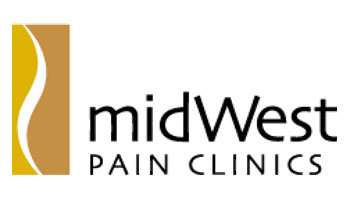Celiac Plexus Nerve Block Omaha, NE
Chronic and Acute Pain Specialties in NE and IA
Home » Celiac Plexus Nerve Block Omaha, NE

Chronic abdominal pain can be a debilitating condition, severely impacting your quality of life and making daily activities difficult. Whether caused by colitis, appendicitis, irritable bowel syndrome (IBS), or more serious conditions like pancreatic cancer, finding effective relief is crucial. At Midwest Pain Clinics, we offer comprehensive solutions for managing chronic abdominal pain, including the celiac plexus nerve block procedure in Omaha, NE.
Our board-certified pain management specialists have extensive experience in diagnosing and treating chronic abdominal pain. We provide personalized care to develop the best treatment plan for each patient, ensuring you receive the highest quality of care to help manage your pain and improve your overall well-being.
What is a Celiac Plexus Block?
A celiac plexus nerve block is a procedure designed to relieve chronic abdominal pain by blocking pain signals between the celiac plexus and the brain. The celiac plexus is a network of nerves located in the upper abdomen near the spine. These nerves transmit pain signals from the abdominal organs to the brain.
During the procedure, medication is injected around the celiac plexus to block these pain signals, providing relief from pain caused by various abdominal conditions. At Midwest Pain Clinics, our pain management specialists in Omaha, NE, use advanced techniques to ensure precise placement of the injection for optimal results.
Request an Appointment
Conditions Treated with Celiac Plexus Nerve Blocks
A celiac nerve block can be an effective treatment for several conditions, including:
- Chronic abdominal pain: Caused by conditions such as colitis, appendicitis, or irritable bowel syndrome.
- Complex Regional Pain Syndrome (CRPS): A chronic pain condition that can affect the abdomen and other areas of the body.
- Pancreatic cancer: Pain caused by the spread of cancer to the abdominal area can be alleviated with a celiac plexus block.
- Post-surgical pain: Pain following abdominal surgery can be managed with this procedure.
If you are struggling with abdominal pain and other pain management techniques have not provided relief, a celiac plexus nerve block may be a suitable option.
Benefits of Celiac Nerve Block
Patients who undergo a celiac plexus block procedure experience several benefits, including:
- Relief from Chronic Abdominal Pain: By blocking pain signals, this procedure provides significant relief, helping patients regain control of their lives.
- Minimally Invasive: The procedure is performed using small needles, with minimal discomfort and a low risk of complications.
- Long-Term Pain Relief: Many patients experience long-lasting pain relief, allowing them to reduce or eliminate their need for pain medications.
- Reduced Medication Dependence: This procedure can help reduce the need for opioid pain medications, which can have significant side effects.
- Complementary with Other Treatments: The celiac plexus nerve block can be used alongside other pain management techniques, such as spinal cord stimulation, nerve blocks, and trigger point injections for enhanced results.
At Midwest Pain Clinics, we tailor your treatment plan to ensure the best possible outcomes for your specific condition.
How is a Celiac Nerve Block Performed?
The celiac nerve block is a straightforward procedure that typically takes 30 minutes to an hour. Here’s what to expect:
- Preparation: The procedure is performed in a sanitized environment to ensure safety. A local anesthetic is applied to the injection site to minimize discomfort.
- Imaging Guidance: Using fluoroscopy or CT imaging, the doctor guides the needle to the precise location around the celiac plexus. This ensures accurate placement of the medication.
- Injection: The doctor injects a mixture of anesthetic and pain-relieving steroids into the celiac plexus. This blocks the transmission of pain signals from the abdomen to the brain.
- Monitoring: After the injection, the care team monitors you for any immediate side effects and ensures that you’re comfortable.
- Recovery: Most patients can go home the same day with minimal side effects, such as mild soreness at the injection site.
Our compassionate care team at Midwest Pain Clinics is dedicated to ensuring your comfort and safety throughout the procedure and during your recovery.
Why Choose Us for Celiac Nerve Block in Omaha, NE?
At Midwest Pain Clinics, we are dedicated to providing effective, compassionate care for patients dealing with chronic pain. Our team of experienced, board-certified pain management specialists in Omaha, NE, offers advanced procedures like the celiac plexus nerve block to help you achieve lasting relief. With state-of-the-art facilities and a patient-centered approach, we strive to improve your quality of life and help you regain control over your health.
Contact us today to learn more about the celiac plexus nerve block procedure and how we can help you find relief from chronic abdominal pain. Let us be your partner in your pain management journey.
FAQs About Celiac Plexus Nerve Block
What conditions can a celiac plexus block treat?
A celiac plexus block is commonly used to treat chronic abdominal pain caused by conditions such as colitis, irritable bowel syndrome, pancreatic cancer, and Complex Regional Pain Syndrome (CRPS). It is also effective for managing post-surgical pain in the abdomen.
How long does the procedure take?
The celiac nerve block procedure typically takes 30 minutes to an hour, with most patients able to return home the same day.
How long does the pain relief last?
Many patients experience significant pain relief that can last from several weeks to several months. In some cases, the procedure can be repeated for extended relief.
Is a celiac plexus block right for me?
If you are suffering from chronic abdominal pain and other treatments have not provided adequate relief, a celiac plexus block may be a suitable option. Our specialists will evaluate your condition and discuss the best treatment plan for you.

